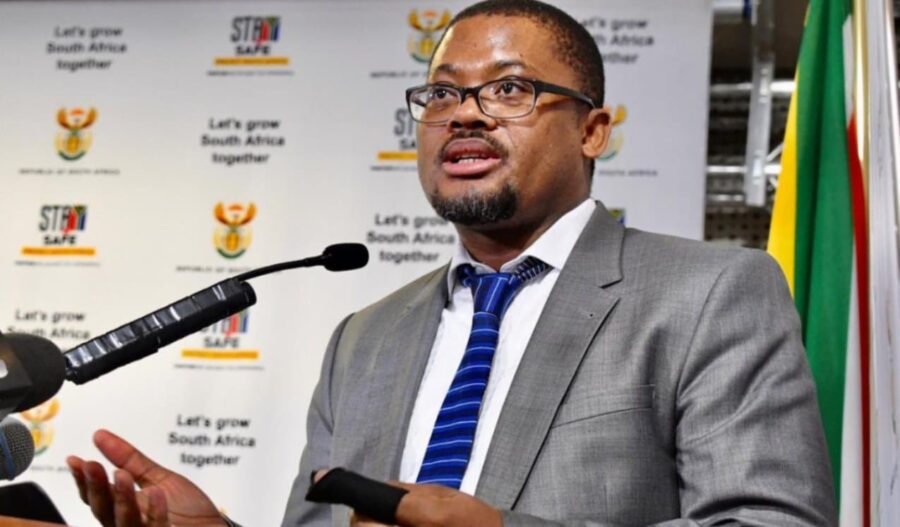
Leadership lessons from the 2023 Rugby World Cup finals
From this world cup installment, I have been enriched by these notables says Busani Ngcaweni the Principal of the National School of Government.

First, I must declare that I am not much into the sport of rugby In fact, I don’t understand half the rules of the game. Having watched it since the last success by the team, I have come to realise that what I always regarded to be a hooligan sport is in fact a game of strategy and tactics. There is elegance in the wrestling madness. From this World Cup instalment, I have been enriched by these notables:
Lesson Number One: Always lead from the front. Be prepared to do or get into messy situations and get things done. Roll up your sleeves and lead by example in doing what needs to be done for the mission to be accomplished. When you do that, people will know that their leader is not only there to bask in the glory of success, but is willing to get hands dirty and break bones along with all of them, thus inspiring confidence and getting team members mobilized. Siya Kolisi did that.
Lesson Number Two: Although it may sound like a tired cliché, this rugby World Cup-winning team has once again reminded us that in any organization, teamwork matters, and that the leadership is part of (not above) the team. Therefore, the leader should not stand on the podium or high office shouting instructions. Teamwork means recognizing the energies and talents of different people, allowing different ideas and talents to thrive. That way the diversity and energies of different people, from the most junior to the most senior, will be brought to bear and help the organization/team to succeed.
Lesson Number Three: For leaders to succeed they must be comfortable with the idea of working alongside the most talented people. As we saw in our rugby team, there are players, young and older, who are more talented than the captain, yet he remains their captain. By embracing these most talented players and actively cheering them, he himself becomes a superstar. With your guidance as team leader or captain, talented people will find creative ways of getting the job done successfully, and such success, in the final analysis, is to be cherished by all. As captain, you will lift the trophy. Talented people get the job done. Untalented people have a problem with every solution. They are exhausting and dangerous like re-thread tires – when the road gets hot and the load heavier, they buckle and cause a mess for everyone on the road. That is why the captain of this team, from the first to the last match, was always happy to be substituted and go sit on the bench without sulking each time the coach made that call. He always understood that even as he sat on the bench, the victory of the talented people inside the rugby pitch would be his victory. He led them from the back and neither lost his confidence nor his shine. In fact, he became more effective as he could guide and motivate without the pressure of being next to the ball. At the end of the day victory is his. He lifted the trophy. He leads the headline. He made history by accepting that there are other more talented and agile players, who are there as part of the team to make a sterling contribution. And sure they did, in every game. That is a remarkable leadership trait that many of us need to embrace for our organizations to succeed.
Lesson Number Four: Have reliable and visible core-pilots. These are people who will lead with you and take the organisation to success. They must be willing to make tough decisions; they must be ready to enter the scrum and get their hands dirty; they must not be afraid to be unpopular with other members of the team. Co-pilots must be as much willing to take the blame as they are to share the glory. After all, they are part of the leadership collective of the organization. They must take equal responsibility in as much as they take the credit. Co-pilots must inspire confidence amongst the people/team members in the aircraft or the ship. Team members must know that the co-pilot will not sink the ship if the captain drops dead. They must know that with the captain not in the cockpit, the destination (success) and the path (game plan) towards that destination are the same. Co-pilots must be solid, talented, brave and willing to take risks as we saw in this game. The deputy captain (as part of the leadership collective) was remarkable Mbonambi.
Lesson Number Five: Never underestimate any challenge. We saw in this World Cup that the team played every game as if it was the final match. From this, they tested their fortitude and agility. It is hard but essential to keep the team motivated especially during difficult times when it seems like the dream is fading away. Staying focused on the vision, whilst making technical adjustments in response to situations, builds cohesion and lifts spirits. Rigidity must make way for flexibility. The coaching staff was at their best in this regard. They made difficult but effective, calls. Their calculated risks paid off.
Lesson Number Six: Never create doubt among your team members. Be transparent. Be consistent. Be predictable. Do not create factions. Treat everyone equally. Embrace diversity. Be prepared to do what you expect from others. Be the shield – your team members must know you have them covered.
ALSO READ: Rugby: Cape Town to welcome World Champion Springboks for victory parade
Lesson Number Seven: Be humble. Arrogance and rank consciousness break spirits and discourage people. You become a monster who is feared and people find ways to undermine you. They give you nicknames and mock you. In the end, you lose more than they do. You become a captain (and or coach) who achieved nothing. You are remembered for failure rather than success. With all his achievements, Siya Kolisi remains humble. He acknowledges the roles and contributions of others, thus endearing himself with his teammates, coaches and supporters. His modesty in the era of the big ego was humbling. Kolisi is a superhero, a marvel whom we are learning from. Thank you for being such a role model. Every boardroom deserves your portrait.
Busani Ngcaweni is the Principal of the National School of Government
